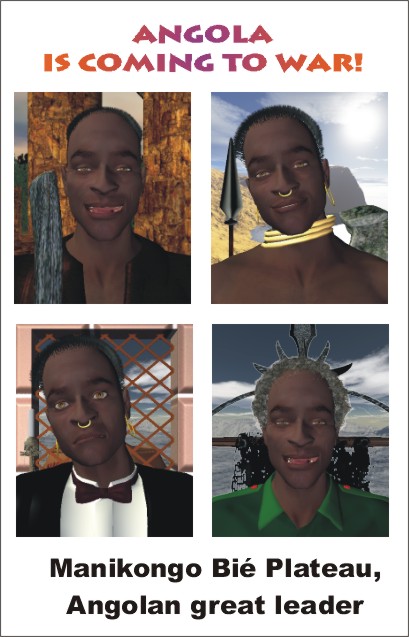This is the Angolan civilopedia, with someone help me with that, I'll appreciate.
There is few registers about Angola before the XV century, when the Portuguese arrived in the present country. The people that lived there were from Bantu-speaker root, people that inhabitant southern Africa divided in many groups, as the Zulus. The Khoisan was another important root of this region. The people of these groups lived in small groups, were farming, hunting and gathering and their migrations started from the rain forest near what is now the Nigeria and Cameroon nations. The Bantu settled in Angola between 1300 and 1600, more may have arrived even earlier.
The Bantu formed a number of historically important kingdoms, the earliest and most important was the Kongo Kingdom, which arose between the XIV and XV century in an area overlapping the parts of present Angola and Democratic Republic of Congo (former Zaire), in central black Africa. Other important kingdoms were Ndongo, Matamba, Kasanje, Lunda, Bié, Bailundu, Ciyaka, Kwanhama and Chokwe.
Slave trading dominated the Angolan economy in XVIII century. Slaves were obtained by agents called Pombeiros, who roamed the interior, generally following established routes along rivers, some kind of Bandeirantes of Brazil. These Pombeiros got money of European and neo-Brazilian farmers and exchange the slaves by cloths and wine with the tribal chiefs. The African Slave was more resistant to diseases than the Native American one and was more easily to be slavery. Because Brazil was the main colony, Angola did not receive special attention from its Metropolis. The slavery was abolishing just in 1836, when England wanted create a bigger consumer marketing in Americas, Africa and Asia.
The country had its independence just in 1975 when it was divided by two main organized forces: MPLA supported by URSS and UNITA supported by US. These two armed forces fought and took over the country for many times, until today the tension is high.
The most important king of the Kwahama group was Bié Plateau, in Civilization 3 he received the title of Manikongo, the title of the kings of the old Kingdoms in Angola. He fought against the Portuguese in colonial times when he has turned the leader of the armed group Kwanhama in the XIX century.
Kwanhama, UU da Angola:
The Kwanhama group, belonging to the Bantu-speaking root, established a kingdom early in the XIX century in the vicinity of the border with present-day Angola and Namibia. Kwanhama kings welcomed trade with Europeans, especially with Portuguese and German gun dealers. Feared even by the Portuguese, the well-armed Kwanhama developed a reputation as fierce warriors. Their kingdom survived until 1915, when a large Portuguese army invaded and defeated then.
Kwanhama replace Infantry, cost 100 instead 90 and does not need Rubber to be done.




